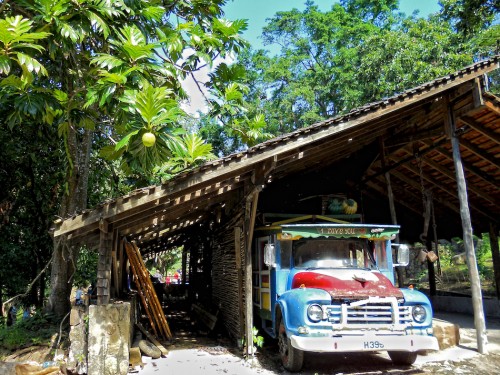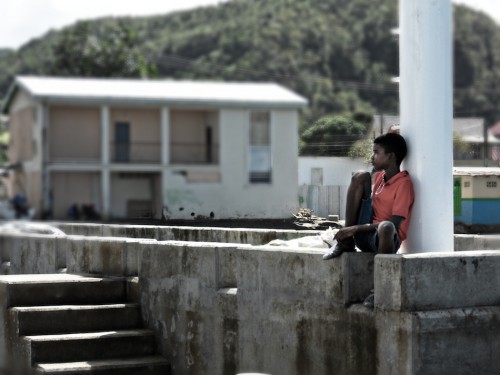The question of human rights points us toward a myriad issues that require addressing. It seems, however, that when addressing human rights, we might begin by thinking about the question of human dignity. In my year living on the small Caribbean island of St. Lucia, a place where most of my friends struggle to make a living, I have thought about livelihoods and the local economy as related to the question of restoring human dignity.
I spoke on the phone with a friend last month, on the eve of his departure to a foreign country, where he will be spending the next eight months without electricity or running water. In between joking about bucket showers (of which I have had my share in the aftermath of Hurricane Tomás, which battered the island in October), we talked about a personal project on which he hopes to work while there, which would begin with asking people about the local economy.
As our discussion progressed, I realized that many of my conversations with people in my community have inadvertently spiraled back to the question of the local economy. Many people, especially those of a certain generation, will point to drugs as the source of many social ills, acknowledging that a lack of jobs (well-paying or otherwise) has forced many young men to the dangerous world of selling arms and narcotics. And as expensive lifestyles are increasingly glorified on television, in popular music, and in films, young Lucians balk at the notion that life during their parents’ coming of age was sweeter. No electricity, no running water, getting one’s hands dirty working on the land—it is a reality very distant from the life romanticized in music videos on BET.

Lucians of a certain generation, however (and by that I mean those in their forties and above), look back wistfully at the days of yore as late as the 1980s, when St. Lucia really was “Sweet St. Lucia”: a time when people lived off the land, collected water from the river, television was scarce and violence even more so, and everyone said hello to each other.
I thought of these conversations as I read a widely circulated op-ed by the columnist David Brooks, which asked whether the present generation’s quest for meaningful livelihoods, versus profit-driven careers, has had an adverse effect on the American economy. Brooks, like my older Lucian friends, looks back at the bygone age of economic boom in America, but unlike the era of “Sweet St. Lucia,” this golden age in the U.S. was one driven by profit and upward mobility. He writes:
It could be that the nature of technological change isn’t causing the [economic] slowdown but a shift in values. It could be that in an industrial economy people develop a materialist mind-set and believe that improving their income is the same thing as improving their quality of life. But in an affluent information-driven world, people embrace the postmaterialist mind-set. They realize they can improve their quality of life without actually producing more wealth.
Brooks, in so many words, insinuates that a quest for meaning in life—advancing one’s education, taking vacations to adventurous locales, spending more on health care—has contributed to the weakening of the American economy.
But change is a necessary and inevitable phenomenon, and our world is indeed headed in a different direction. Bahá’u’llah wrote that “All men have been created to carry forward an ever-advancing civilization.” What worked in post-World War II America would no better serve the U.S. as would doing away with running water and electricity in present-day St. Lucia. The American materialist mindset, for example, has sometimes had a damaging effect on the environment, and at times perpetuated global inequality.
After my phone conversation with my friend, I started to think about what a stronger local economy—driven by and serving those at the level of the neighborhood, village, or town—might look like in my town of Vieux Fort, or within my neighborhood of Cantonmenent.
I thought of the sugary imported soft drinks sold in our local shops, and then I thought of the rotting mangoes that carpet the rich soil underneath large, leafy mango trees—mangoes that could make for tastier (and healthier) juices, if only locals were organized to pick the fruits and produce and package the juice.

I thought of the many schoolchildren languishing at home on weekdays, or scampering about the roads, when their parents lacked the few dollars needed to send them to school, and then I thought of the young adults in their own neighborhood, accustomed to children after helping raise their younger siblings, demoralized for lack of jobs demanding even the most basic of skills. I thought about how I had heard about a neighborhood father, concerned about local children skipping school so often, tried to establish a neighborhood school, a project that stopped for lack of support.
No one knows for certain what the economics of the future might look like. But perhaps we do would do well to begin to think about changing habits of thought, which begins by infusing our thoughts and actions with spiritual principles, as essential to bringing about a more just and equitable economy: Recognizing the power of ideas in the transformation of societies enables us to understand the implications of many of ‘Abdul-Bahá’s statements which encourage people to change the world by changing the way they think. He admonished Americans to manifest ‘true economics’ by showing love, kindness, severance, and generosity. He advocated spiritual strategies for transforming trade and government.
Hooper Dunbar, Forces of Our Time, p. 28.
My heart breaks when I speak to my Lucian peers who cannot find jobs, or who feel compelled to leave their country to make a living. My only consolation is that we are laying the foundation of a world civilization, beginning at the local level, which must be characterized by those timeless principles that help us to prosper both materially and spiritually.